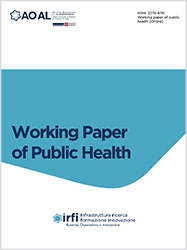Biobanking and Project Management

Accepted: 29 September 2023
All claims expressed in this article are solely those of the authors and do not necessarily represent those of their affiliated organizations, or those of the publisher, the editors and the reviewers. Any product that may be evaluated in this article or claim that may be made by its manufacturer is not guaranteed or endorsed by the publisher.
Objectives: the growth of standardization parallels and correlates with the architectural complexity of biobanks governance and organization. The management of such complexity, from which varied scenarios originate, requires precise working methodologies. This article highlights the nature of next-generation biobanks and summarizes the concepts supporting the project management scaffolding. Methods: the methodology used to collect the data necessary to produce the working paper is a narrative and meta-synthesis review of the literature inherent in the areas of quality, economics and social engagement of biobanks and the latest project management methodologies. Results: new generation biobanks possess a multipurpose structure mainly based onthe three macro areas of “Quality Management”, “Business Management” and “Social Engagement Management” necessary to ensure their sustainability, i.e., their own life cycle. Conclusions: Project Management, through its conceptual scaffolding and the models it offers, can be the most appropriate tool for managing complexity that characterizes the structure of biobanks, by allowing an organized, structured and integrated approach, both for pursuing the implementation of the process of regulatory standards and for managing the macro-areas of each biobank with related processes, phases, sub-processes, sub-phases and activities.
OECD.Stat. 2006. Statistiche OCSE. Available from: https://stats.oecd.org/
Kinkorová J. Biobanks in the era of personalized medicine: Objectives, challenges, and innovation. The EPMA Journal. 2016;7:4. DOI: https://doi.org/10.1186/s13167-016-0053-7
Baker M. 1,500 scientists lift the lid on reproducibility. Nature. 2016;533:7604. DOI: https://doi.org/10.1038/533452a
Pétavy F, Seigneuret N, Hudson LD, et al. 2019. The Turning Point for Clinical Research: Global Data Standardization. Applied Clinical Trials. Available from: https://www.appliedclinicaltrialsonline.com/view/turning-point-clinical-research-global-data-standardization
ISO. 2018. ISO 20387:2018. Available from: https://www.iso.org/standard/67888.html
Simeon-Dubach D, Watson P. Biobanking 3.0: Evidence based and customer focused biobanking. Clinical Biochemistry. 2014;47:300-8. DOI: https://doi.org/10.1016/j.clinbiochem.2013.12.018
Gottweis H, Zatloukal K. Biobank governance: Trends and perspectives. Pathobiology: Journal of Immunopathology, Molecular and Cellular Biology. 2007;74:206-11. DOI: https://doi.org/10.1159/000104446
Dagher G. Quality matters: International standards for biobanking. Cell Proliferation. 2022;55. DOI: https://doi.org/10.1111/cpr.13282
Riegman PHJ, Becker KF, Zatloukal K, et al. How standardization of the pre-analytical phase of both research and diagnostic biomaterials can increase reproducibility of biomedical research and diagnostics. New Biotechnology. 2019;53:35-40. DOI: https://doi.org/10.1016/j.nbt.2019.06.007
Vaught J, Rogers J, Carolin T, Compton C. Biobankonomics: Developing a Sustainable Business Model Approach for the Formation of a Human Tissue Biobank. JNCI Monographs, Oxford Academic, UK. 2011. Available from: https://academic.oup.com/jncimono/article/2011/42/24/935966 DOI: https://doi.org/10.1093/jncimonographs/lgr009
Clément B, Yuille M, Zaltoukal K, et al. (Public biobanks: Calculation and recovery of costs. Science Translational Medicine. 2014;6:261fs45. DOI: https://doi.org/10.1126/scitranslmed.3010444
Lemke AA, Wu JT, Waudby C, et al. Community engagement in biobanking: Experiences from the eMERGE Network. Genomics, society, and policy. 2010;6:50. DOI: https://doi.org/10.1186/1746-5354-6-3-50
Mayrhofer M. 2008. Patient organizations as the (un)usual suspects. The biobanking activities of the Association Française contre les Myopathies and its Généthon DNA and Cell Bank. Available from: https://www.taylorfrancis.com/chapters/edit/10.4324/9780203927991-7/patient-organizations-un-usual-suspects-michaela-mayrhofer
Mitchell D, Geissler J, Parry-Jones A, et al. Biobanking from the patient perspective. Research Involvement and Engagement. 2015;1:4. DOI: https://doi.org/10.1186/s40900-015-0001-z
Henning CHCA, Wald A. Toward a wiser projectification: Macroeconomic effects of firm-level project work. International Journal of Project Management. 2019;37:807-19. DOI: https://doi.org/10.1016/j.ijproman.2019.04.002
Association for Project Management (APM). 2022. What is project management? Available from: https://www.apm.org.uk/resources/what-is-project-management/
Project Management Institute (PMI). 2023. What is project management? Available from: https://www.pmi.org/about/learn-about-pmi/what-is-project-management
Capaldo G, Volpe A. Project Management. Principi e metodi. McGraw-Hill Education; New York, USA. 2021.
de Carvalho MM, Patah LA, de Souza Bido D. Project management and its effects on project success: Cross-country and cross-industry comparisons. International Journal of Project Management. 2015;33:1509-22. DOI: https://doi.org/10.1016/j.ijproman.2015.04.004
Abbott KW, Snidal DJ. The governance triangle: Regulatory standards institutions and the shadow of the state. In: The Spectrum of International Institutions. Routledge; Abingdon, UK. 2021.
Copyright (c) 2024 Paolo Bonvicini, Roberta Libener, Valentina Amore, Giulia Oliveri, Antonio Maconi

This work is licensed under a Creative Commons Attribution-NonCommercial 4.0 International License.
PAGEPress has chosen to apply the Creative Commons Attribution NonCommercial 4.0 International License (CC BY-NC 4.0) to all manuscripts to be published.

 https://doi.org/10.4081/wpph.2023.9768
https://doi.org/10.4081/wpph.2023.9768




